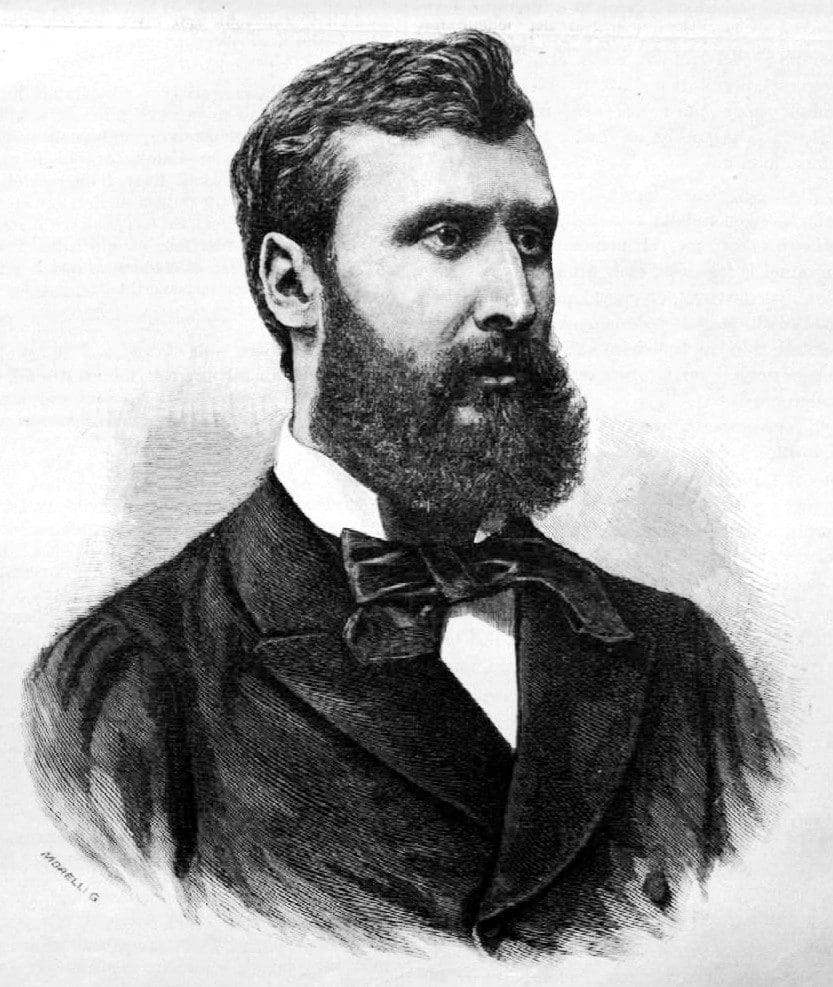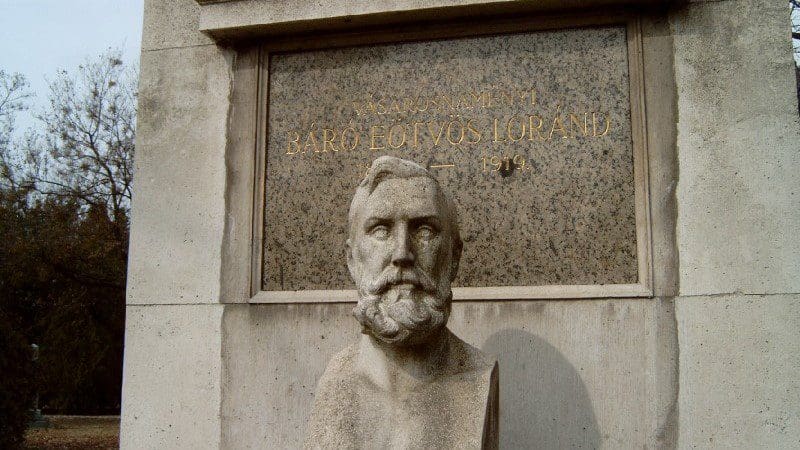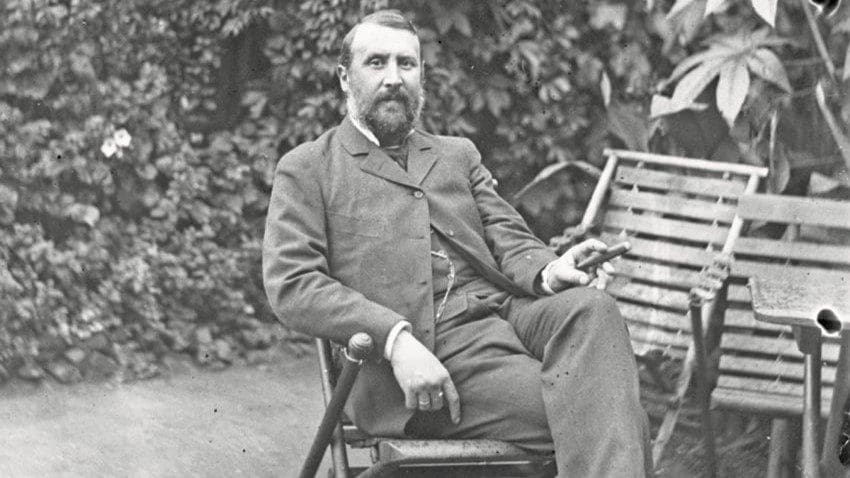On 27 July 1848, Baron Loránd Eötvös, the researcher of gravitational fields and the first great Hungarian cultivator of systematic experimental and theoretical physics research, was born in the Svábhegy district of Buda. It can be reasonably argued that he was one of the greatest, internationally most important, and at the same time most respected Hungarian physicists.
When looking at the date of his birth, perhaps all Hungarians think of the glorious period of the Hungarian Revolution of 1848, and when we see his name, most of us think of his father Baron József Eötvös, a famous Hungarian liberal politician and writer of exceptional talent. The name Eötvös, however, conjures up the following concepts in the minds of anyone who is familiar with physics, whether Hungarian or of any other nationality: the Eötvös rule; the Eötvös number; Eotvos, a unit of gravitational gradient; the Eötvös effect; the Eötvös experiment; the Eötvös Loránd Physics Society; the Eötvös Loránd Geophysical Institute; or the Eötvös Loránd University (ELTE). As we can see, physical laws, units of measurement, and institutions bear the name of Loránd Eötvös.
But who exactly was he? What is worth knowing about the Hungarian physicist, inventor, politician, minister, academic, teacher, and, finally yet importantly, mountaineer?
Not many would have bet that the son of József Eötvös and Agnes Rosty de Barkócz, the daughter of a noble family, would become a physicist, as family and national traditions would have predestined the aristocratic son for a different career. In accordance with the customs of the era, he was homeschooled until 1860, then finished his studies at the Piarist Grammar School in Pest in 1865. After that, it was still no surprise that he became a law student, but there was something that proved to be more unusual: besides studying law, he also studied science and worked in the laboratory of a renowned physical chemist. As time went by, Eötvös became increasingly aware that he had to choose between law and science. Eventually, the political events of 1867 and the advent of the Compromise made him dislike the world in which his father had lived—and in which he was appointed Minister of Religion and Public Education after 1848—, and he finally enrolled at the University of Heidelberg, where three world-famous German natural scientists (Gustav Kirchhoff, Hermann Helmholtz, and Robert W. Bunsen) were teaching at the time.
On 28 March 1866, before his trip abroad, Loránd Eötvös wrote the following lines to his father:
‘Ambition and a sense of duty…are my inborn qualities,
[and] to satisfy these two impulses while maintaining my individual independence: this is my life goal, and at least so far I have found that I can best fulfil it by entering a scientific career.’ A year later, on 24 March 1867, when his career choice seemed for the time being decided, the political father wrote to his son: ‘…it is a real comfort to me to see you in another career. Go forward with courage and don’t regret your efforts. The greatest efforts in science will be rewarded, because it is not expected from men, but is found in science itself.’
These words, perhaps above all others, accompanied Loránd Eötvös throughout his whole life. For him, the reward of scientific work remained indeed always science itself.[1]
Eötvös also studied in Königsberg, former Prussia, but the lectures on theoretical physics there discouraged him from the discipline. Therefore, he had a plan in mind to join an expedition to the Arctic led by a scientist called Petermann, but eventually, his father talked him out of it. His break was only temporary:
in 1870, at the age of just 22, he received his doctorate from Heidelberg with distinction.
On the day of his doctorate, 8 July, he wrote to his father the following lines:
‘…[it is] an honour envied by many. It also entitles me, after submitting a thesis and completing a number of formalities, to an associate professorship at the university. This degree is not very widely distributed here; I understand that only one other candidate has been awarded it this semester, and you may be pleased to know that he is Hungarian as well…His name is Gyula König, born in Győr—a mathematician.’[2]

After his return from abroad, he applied for a private teaching qualification at the Budapest Faculty of Humanities in Pest. The committee, which also included Hungarian inventor, engineer, and physicist Ányos Jedlik, gave a positive evaluation of his application, which his father, however, unfortunately, did not live to see, as he died on 2 February 1871. In 1875, Eötvös married Gizella Horvát, born in Szombathely and of bourgeois origin, who was the daughter of Boldizsár Horvát, the Minister of Justice in the Andrássy Government. Their marriage resulted in three daughters.
Loránd Eötvös became head of the Department of Experimental Physics in 1878, a full member of the Hungarian Academy of Sciences (MTA) in 1883, and President of the Academy between 1889 and 1905. He left the cathedra only very briefly in 1894 when he became Minister of Culture. He was active in the Royal Hungarian Natural History Society, and in 1891, he was one of the founders of the Mathematical and Physical Society, which started a journal called Mathematical and Physical Papers. His idea of the Königsberg expedition was no accident either: he was a passionate mountaineer, just like his father. It is not surprising therefore, that he was elected president of the Hungarian Tourist Association and the Hungarian Carpathian Association, too. He also conquered new peaks in the Alps and Tyrol that had previously been considered unclimbable, and in 1902, even a peak in South Tyrol was named after him. Apart from climbing, he was a passionate cyclist and an excellent horse-rider as well.
The Hungarian physics genius
whom Einstein referred to as the ‘Prince of Physics’
died on 8 April 1919. The great scientist’s body was laid out in the Hungarian National Museum, and from there he was escorted to his final resting place in the Fiumei Road Cemetery on 11 April.

Loránd Eötvös was active as a scientist and teacher for almost fifty years. His role model in his relationship with his homeland was Hungarian politician Count István Széchenyi, ‘the Greatest Hungarian’—he believed that the Hungarian nation could only be elevated by the work and achievements of its members; his deeds prove that Eötvös lived and worked according to this philosophy. The half-century of his active years not only reflects the incredible intellectual richness of a single human life but has also left an indelible mark on the history of science, education, and the entire cultural life of our country.[3]
[1] Jolán M. Zemplén and László Egyed, Eötvös Loránd. https://mek.oszk.hu/03200/03286/html/eotvos1/eotv8.html, accessed 23 July 2023.
[2] Ibid.
[3] Ibid.








